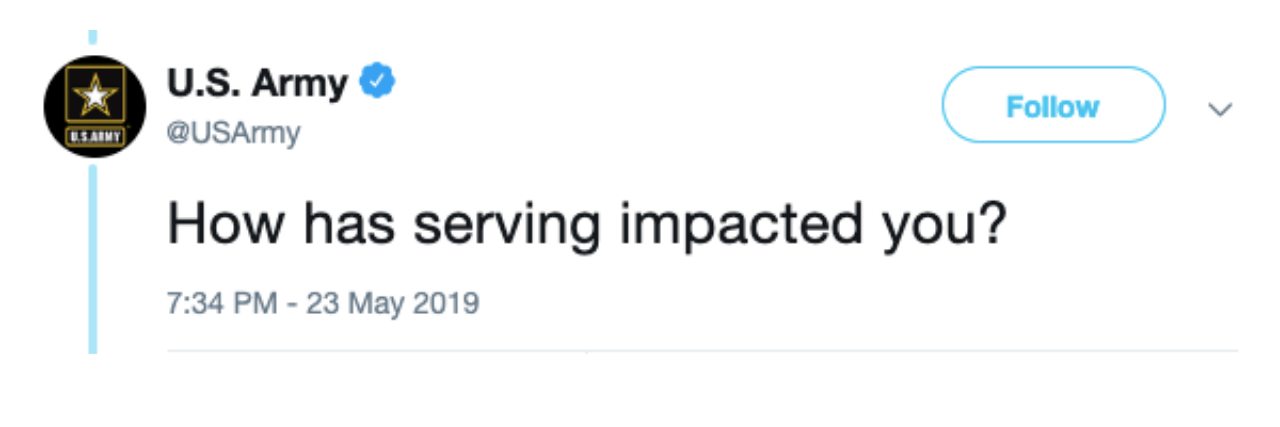U.S. Army Tweet Backfires, Instead Gets Heartbreaking Response from Veterans
Editor's Note
If you experience suicidal thoughts or have lost someone to suicide, the following post could be potentially triggering. You can contact the Crisis Text Line by texting “START” to 741741.
On May 23, a U.S. Army tweet about serving in the military garnered thousands of stories from current and previous service members. The thread highlighted a stark reality about the mental health of U.S. active and veteran military members and the lack of support many receive during and after their service. The U.S. Army later responded, vowing to take care of its service members.
The conversation began on social media after the U.S. Army tweeted a video of a service member sharing how the military influenced his life, followed by a question: “How has serving impacted you?”
How has serving impacted you?
— U.S. Army (@USArmy) May 23, 2019
The tweet elicited thousands of replies that painted a heartbreaking picture of life for some active and veteran military members, with responses highlighting mental health challenges, a lack of services and sexual assault reports that went ignored.
Depression, anxiety, still can’t deal well with loud noises. I was assaulted by one of my superiors. When I reported him, with witnesses to corroborate my story, nothing happened to him. Nothing. A year later, he stole a laptop and was then demoted. I’m worth less than a laptop.
— schmox (@IvoryGazelle) May 25, 2019
I was sexually assaulted, fought it in court martial and lost. He knows what he did and got away free. The system failed me. Now I suffer from severe anxiety, depression and ptsd symptoms.
— Karly Kathleen???? (@always_karly) May 28, 2019
The response to the Army’s tweet — you can read the whole thread here — reflects the statistics of veteran mental health. According to a 2016 report from the U.S. Department of Veterans Affairs (VA), veterans were 1.5 times more likely to die by suicide than civilians. The National Alliance on Mental Illness (NAMI) cited research showing the rate of post-traumatic stress disorder (PTSD) is as much as 15 times higher in military personnel than the general public and the rate of depression five times higher.
Given these statistics, many tweets also reflected the need for better services from the VA. In 2016, for example, the VA reported that veterans who used VA health services were more likely to attempt suicide than veterans who did not seek services. Recently, President Donald Trump signed an executive order to establish an initiative to reduce the veteran suicide rate.
In response, the U.S. Army thanked those who shared their stories in a series of tweets, vowed to take care of its members and shared resources for those who are struggling. The Army tweeted:
“Your stories are real, they matter, and they may help others in similar situations. The Army is committed to the health, safety and well-being of our Soldiers,” the Army tweeted, continuing:
As we honor those who paid the ultimate sacrifice this weekend by remembering their service, we are also mindful of the fact that we have to take care of those who came back home with scars we can’t see.
As we honor those who paid the ultimate sacrifice this weekend by remembering their service, we are also mindful of the fact that we have to take care of those who came back home with scars we can’t see.
— U.S. Army (@USArmy) May 25, 2019
The Army also shared the link to the Veteran’s Crisis Line, where U.S. military members can get immediate support and connect with local resources, adding, “If you or someone you know is in need of help, please call the Veterans Crisis Line at 1-800-273-8255 (and press 1 to talk to someone NOW).”
If you or someone you know is in need of help, please call the Veterans Crisis Line at 1-800-273-8255 (and press 1 to talk to someone NOW) or visit https://t.co/QWphIbzxEj
— U.S. Army (@USArmy) May 25, 2019

